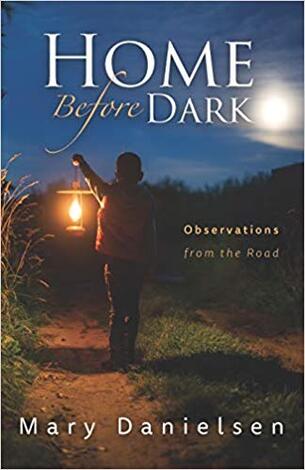Memories like these were one reason for the title Mary Danielsen gave her irresistible new book. As she writes in its prologue, “There was only one summertime rule: Be Home Before Dark. No exceptions … home where a light is always on, and someone is happy you arrived safely. Home before things just get ugly out there.”
Such memories certainly evoke feelings of nostalgia, “a sort of melancholy, dream-like memory of some pleasant experience, or of a simpler or happier time.” But as Danielsen points out, the word “originally meant much more; a ‘strong desire to go home.’ A ‘longing for something far away.’"
And there’s more, she says: Amazingly, “The earliest form of the word actually meant, ‘He returns.’” Which of course is what Jesus has promised to do—in His second coming, certainly, but even before that, when He comes to take His children home to heaven before the prophesied Great Tribulation plunges this world into terrifying darkness.
“I love that,” the author writes of this original definition, “because I do long for that simpler time sometimes, but even more so, I long for Him to return. Perhaps today, I will be home before dark.”
An irresistible read
This prologue is a compelling introduction to a collection of 69 short essays on a wide variety of biblical topics. Each one relates in some way to the end times foretold in scripture. And each is anchored by a pertinent Bible verse.
Home Before Dark provided me with a number of “aha!” moments, simply by presenting familiar topics in ways I’d never considered before.
For instance, “Just a Second” examines the time involved in 1 Corinthians 15:51’s promise that “in the twinkling of an eye we shall all be changed.” How long is that? “The General of Electric measured the twinkling of an eye,” Danielsen writes, “and it comes out to a deca-second, or about a tenth of a second, lest you think that the Bible doesn’t talk about the divisions of seconds and such, because it does. We will receive our new bodies in a deca-second. We won’t even be able to wave bye-bye.”
Another example: In “Bits and Bytes,” Danielsen talks about cryptocurrencies like Bitcoin and how they’re preparing us for the impending cashless society. “Trendy currencies could be just the thing to get people to think they are just the ‘common man’ bank-free money they’ve been waiting for,” rather than a tool of the global economy and the global government’s airtight control over all buying and selling (per Revelation 13:17).
In reading this book—slowly, nursing it because it’s not long enough and I didn’t want it to end—I often thought “well said!”
Let me give you just one example. In “A Question of Balance,” she laments yoga’s growing impact on the church. “Most Americans tend to leave their spirituality in the pew on Sundays,” she writes, “not being able to make the connection that other religions have long mastered: that spirituality is your life, not just a hobby you can pick up and leave off as you please, like knitting.” And then she adds, “In the same way that Christianity is evangelistic in practice, so does yoga represent the Hindu missionary arm.” Exactly.
Home Before Dark even gave me many smiles; this Danielsen girl has a great sense of humor, or at least a sense of humor that appeals to my own.
It’s not just her engaging titles, like “No Shallow End in this Pool,” “When Deloreans Fly,” “Weapons of Math Destruction” and “Living Stones I Presume.”
It’s more that, in the midst of the most serious subjects imaginable, she tosses in many observations that tickled my funny bone. For instance, in “Someone To Watch Over Me,” she writes “Credit scores debuted in the 1980s and along with our cholesterol level gave financially comfortable Americans a couple more numbers to fuss over.” And she opens “Cleanliness and Godliness” thusly: “John Wesley first uttered the maxim ‘cleanliness is next to godliness’ in a sermon back in the 18th century. I have no idea what made him say such a thing.” Indeed.
Hope to see you all there
I could go on. The author touches on everything from the miracle that is modern-day Israel to Oz and the gold standard, from the deceitfulness of charm and beauty to warnings of final judgment. There wasn’t an essay that didn’t make me stop and think.
Then, in a persuasive epilogue, Danielsen makes the case for the pre-tribulation rapture of the church.
“So, I challenge you today,” she writes in closing, “if you are not watching and waiting for Christ on a regular basis, that you get your nose out of whatever distraction has you captive and make your priorities heaven’s priorities. You will never be the same.”
Her conclusion?
“I plan to be home before dark.”
Me too. And I pray that this is your plan as well.

 RSS Feed
RSS Feed